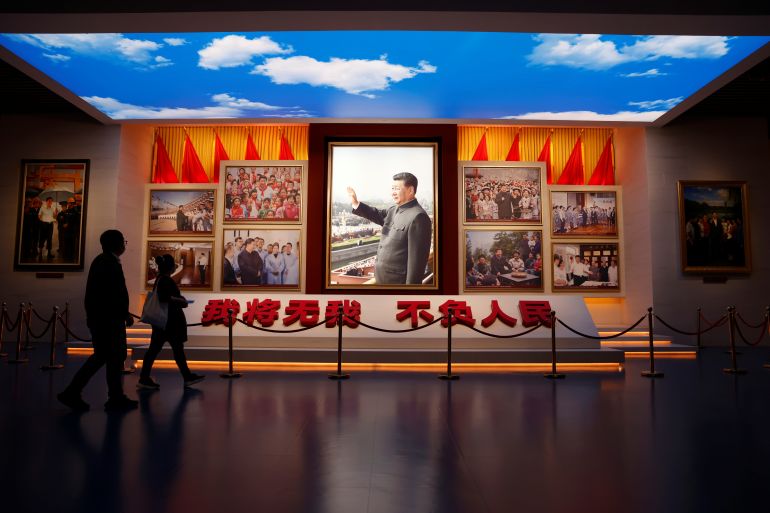China: Communist Party passes resolution on history to elevate Xi
Communist party leaders wrap up key meeting in Beijing seen as cementing President Xi Jinping’s hold on power.

China’s ruling Communist Party has approved a resolution on its history and achievements, the official Xinhua news agency said, a measure seen as further consolidating the authority of President Xi Jinping.
The “historical resolution” came on Thursday at the culmination of the sixth plenum of the party’s Central Committee, a group of about 370 members that chooses its new leaders every five years, which had run since Monday behind closed doors in Beijing.
Keep reading
list of 4 itemsChina and US announce deal to boost cooperation on climate change
China’s Xi warns against Cold War-era tensions in Asia Pacific
China’s Evergrande repays bondholders: source
The Central Committee decided that the lesson to draw from the party’s history was to stay steadfast in 10 areas, with the party leadership being the top priority, Xinhua said.
“The Party Central Committee called on the entire party, the entire army and people of all ethnic groups to unite more closely around the Party Central Committee with Comrade Xi Jinping as the core, to fully implement Xi Jinping’s new era of socialism with Chinese characteristics,” the document read.
In advance of the meeting, the measure was seen as strengthening Xi’s position, a year before he is expected to secure a precedent-breaking third term as party leader.
It was only the third such “historical resolution” since the party was founded in 1921. The earlier two, in 1945 and 1981, had the effect of consolidating the authority of leaders Mao Zedong and Deng Xiaoping, respectively.
No rivals
Xi is widely seen as China’s most powerful leader since Mao.
The party removed term limits on Xi’s post as president in 2018, indicating his intention to stay in power.
The history statement is expected to emphasise the party’s successes in overseeing China’s economic rise and likely ignore deadly political violence in its early decades in power and growing complaints about human rights abuses.
When term limits on the presidency were abolished in 2018, officials told reporters Xi might need more time to make sure economic and other reforms were carried out.
Xi faces no obvious rivals, but a bid to stay in power has the potential to alienate younger party figures who might see their chances for promotion diminished.
Also, political scientists point to the experience of other countries in Asia, Africa and Latin America and warn long periods of one-person rule lead to worse official decisions and economic performance.
Ending ‘Cold War-era’ divisions
The event comes alongside a flurry of international diplomatic activity.
Beijing and Washington announced a surprise climate pact at the COP26 summit on Wednesday – in contrast to their recent sparring – and Xi and US President Joe Biden are expected to hold a video conference in the near future.
However, Xi also warned on Thursday against a return to “Cold War-era” divisions in the Asia-Pacific region during a speech on the sidelines of the Asia-Pacific Economic Cooperation summit, with ongoing tensions over Taiwan.
“Attempts to draw ideological lines or form small circles on geopolitical grounds are bound to fail,” he told a virtual business conference in thinly veiled comments aimed at the United States.
Beijing also hit out this week at a visit by US lawmakers to self-ruled Taiwan, which China views as its territory.